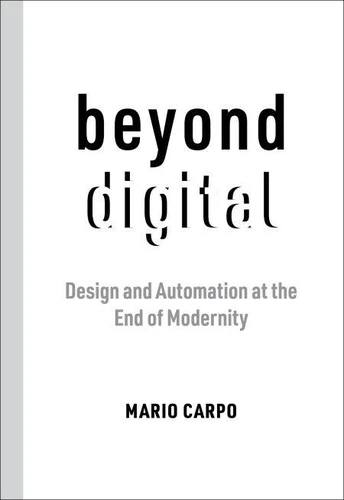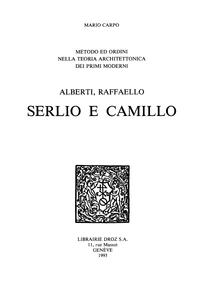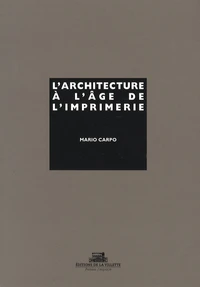Beyond Digital. Design and Automation at the End of Modernity
Par :Formats :
Disponible dans votre compte client Decitre ou Furet du Nord dès validation de votre commande. Le format ePub protégé est :
- Compatible avec une lecture sur My Vivlio (smartphone, tablette, ordinateur)
- Compatible avec une lecture sur liseuses Vivlio
- Pour les liseuses autres que Vivlio, vous devez utiliser le logiciel Adobe Digital Edition. Non compatible avec la lecture sur les liseuses Kindle, Remarkable et Sony
- Non compatible avec un achat hors France métropolitaine
 , qui est-ce ?
, qui est-ce ?Notre partenaire de plateforme de lecture numérique où vous retrouverez l'ensemble de vos ebooks gratuitement
Pour en savoir plus sur nos ebooks, consultez notre aide en ligne ici
- Nombre de pages208
- FormatePub
- ISBN978-0-262-37339-5
- EAN9780262373395
- Date de parution18/04/2023
- Protection num.Adobe DRM
- Taille2 Mo
- Infos supplémentairesepub
- ÉditeurThe MIT Press
Résumé
Recasting computational design: a new modern agenda for a post-industrial, post-pandemic world. Mass production was the core technical logic of industrial modernity: for the last hundred years, architects and designers have tried to industrialize construction and standardize building materials and processes in the pursuit of economies of scale. But this epochal march of modernity is now over. In Beyond Digital, Mario Carpo reviews the long history of the computational mode of production, showing how the merger of robotic automation and artificial intelligence will stop and reverse the modernist quest for scale.
Today's technologies already allow us to use nonstandard building materials as found, or as made, and assemble them in as many nonstandard, intelligent, adaptive ways as needed: the microfactories of our imminent future will be automated artisan shops. The post-industrial logic of computational manufacturing has been known and theorized for some time. By tracing its theoretical and technical sources, and reviewing the design theories that accompanied its rise, Carpo shows how the computational project, long under the sway of powerful antimodern ideologies, is now being recast by the urgency of the climate crisis, which has vindicated its premises-and by the global pandemic, which has tragically proven its viability.
Looking at the work of a new generation of designers, technologists, and producers, Beyond Digital offers a new modern agenda for our post-industrial future.
Today's technologies already allow us to use nonstandard building materials as found, or as made, and assemble them in as many nonstandard, intelligent, adaptive ways as needed: the microfactories of our imminent future will be automated artisan shops. The post-industrial logic of computational manufacturing has been known and theorized for some time. By tracing its theoretical and technical sources, and reviewing the design theories that accompanied its rise, Carpo shows how the computational project, long under the sway of powerful antimodern ideologies, is now being recast by the urgency of the climate crisis, which has vindicated its premises-and by the global pandemic, which has tragically proven its viability.
Looking at the work of a new generation of designers, technologists, and producers, Beyond Digital offers a new modern agenda for our post-industrial future.
Recasting computational design: a new modern agenda for a post-industrial, post-pandemic world. Mass production was the core technical logic of industrial modernity: for the last hundred years, architects and designers have tried to industrialize construction and standardize building materials and processes in the pursuit of economies of scale. But this epochal march of modernity is now over. In Beyond Digital, Mario Carpo reviews the long history of the computational mode of production, showing how the merger of robotic automation and artificial intelligence will stop and reverse the modernist quest for scale.
Today's technologies already allow us to use nonstandard building materials as found, or as made, and assemble them in as many nonstandard, intelligent, adaptive ways as needed: the microfactories of our imminent future will be automated artisan shops. The post-industrial logic of computational manufacturing has been known and theorized for some time. By tracing its theoretical and technical sources, and reviewing the design theories that accompanied its rise, Carpo shows how the computational project, long under the sway of powerful antimodern ideologies, is now being recast by the urgency of the climate crisis, which has vindicated its premises-and by the global pandemic, which has tragically proven its viability.
Looking at the work of a new generation of designers, technologists, and producers, Beyond Digital offers a new modern agenda for our post-industrial future.
Today's technologies already allow us to use nonstandard building materials as found, or as made, and assemble them in as many nonstandard, intelligent, adaptive ways as needed: the microfactories of our imminent future will be automated artisan shops. The post-industrial logic of computational manufacturing has been known and theorized for some time. By tracing its theoretical and technical sources, and reviewing the design theories that accompanied its rise, Carpo shows how the computational project, long under the sway of powerful antimodern ideologies, is now being recast by the urgency of the climate crisis, which has vindicated its premises-and by the global pandemic, which has tragically proven its viability.
Looking at the work of a new generation of designers, technologists, and producers, Beyond Digital offers a new modern agenda for our post-industrial future.





